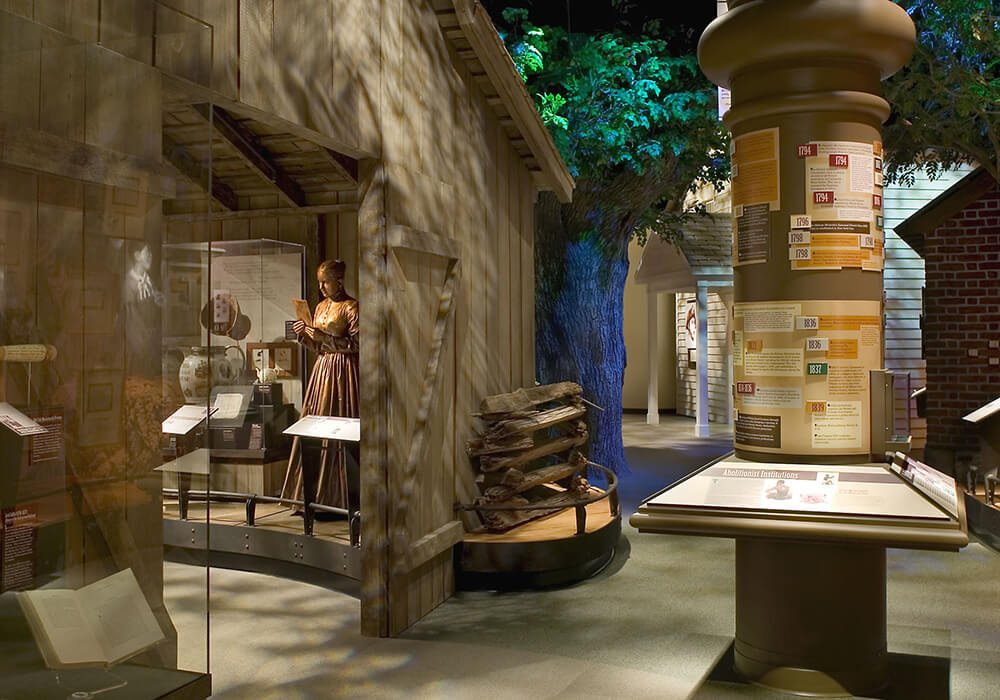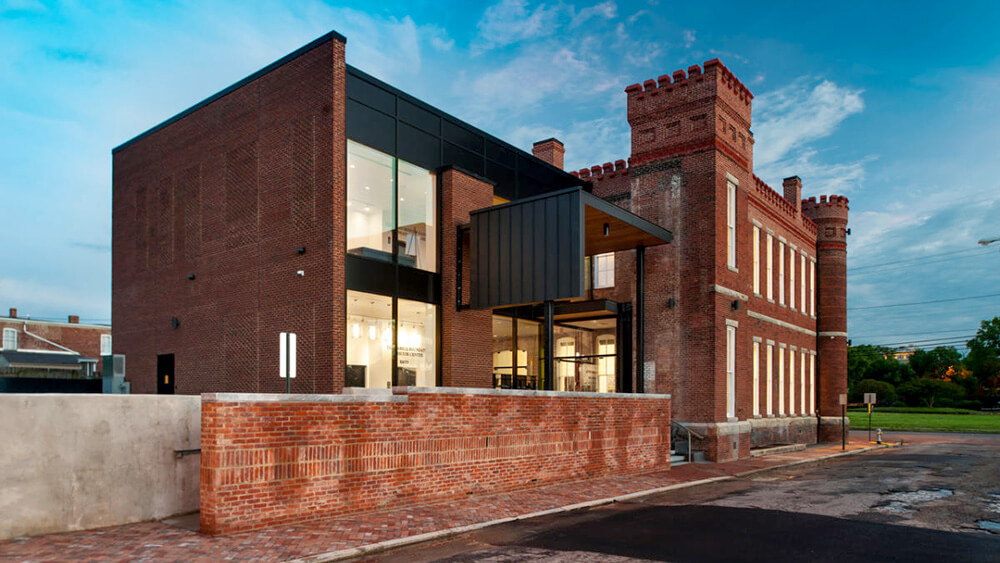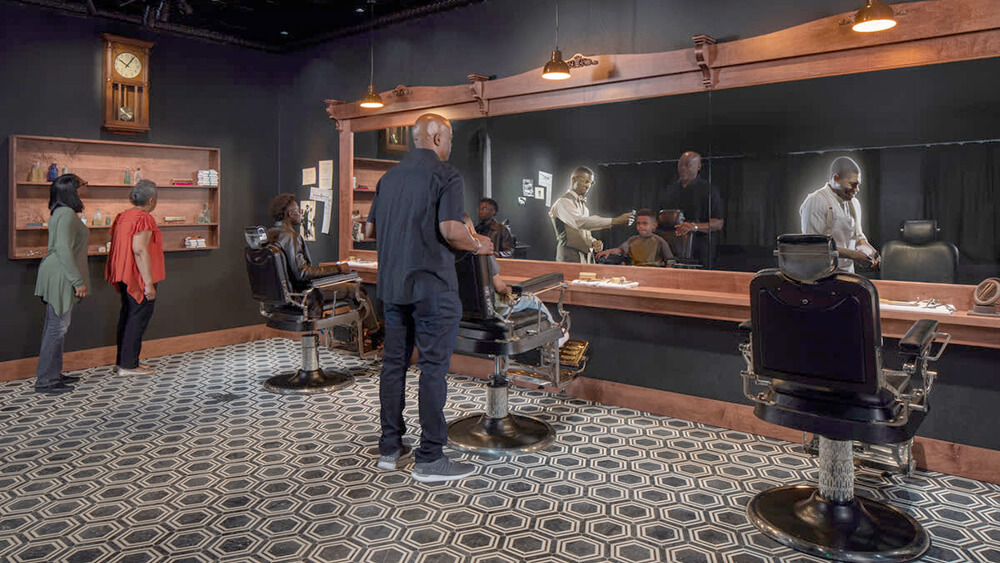
In the largest exhibit space at the National Underground Railroad Freedom Center, visitors explore the Middle Passage, the institution of slavery, the rise of abolitionism and Underground Railroad, and the Civil War. (Farshid Assassi/Assassi Productions)
It’s one thing to read about Black history, but stepping foot in the places that tell the story of the Black experience in the United States adds layers of experience that engage visitors at a deeper level. In honor of Black History month, here are five ways — and five places — where event organizers can immerse participants in the often-untold stories that shed new light on Black history.
The following examples are just a sample: Many destination websites include guides to Black-owned restaurants, businesses, and experiences, and can connect meeting organizers with local Black historians and cultural experts.
Learn the real story about cowboys in the Old West. If you close your eyes and think of an image of a cowboy, you’re likely to picture a white man. But in the 19th century, one in four cowboys were Black, according to Smithsonian magazine, including in Texas where after the Civil War, Black cowboys played a pivotal role in driving cattle on the Chisholm Trail. Cultural historian and author Deah Berry Mitchell, creator of Soul of DFW Black food and history tours, based in the Dallas-Fort Worth area, delves into that history in “Cowboy History Tour: Fort Worth Edition,” alongside Texas barbecue and a tequila tasting. Deah Berry offers customized bus tours departing from Dallas and Fort Worth. Read more about Fort Worth’s Black history and culture at the Visit Fort Worth website.

The Black History Museum & Cultural Center in Richmond, Virginia, is housed in the nation’s only 19th-century armory built for Black militia. (Courtesy BHMVA)
Surround yourself with a complicated history. The Black History Museum & Cultural Center (BHMVA) in Richmond, Virginia, is the nation’s only 19th-century armory built for Black militia and holds a variety of permanent and visiting exhibitions related to Black history and contemporary culture. BHVMA also hosts receptions and other private events in 1,000 square feet of meeting space, including a café with a Woolworth’s sign recalling the sit-ins of the of the 1960s aimed at integrating the five-and-dime retail chain’s segregated lunch counters. Richmond Region Tourism partnered with Black community leaders to create BLK RVA, an initiative that guides visitors to Black culture, cuisine, and entertainment, and links them with resources like the Elegba Folklore Society, which organizes tours and other experiences for groups. Read more about BLK RVA.
Taste history on U Street. Food does a lot of the talking during DC Metro Food Tours’ exploration of U Street, in Washington, D.C., known as “Black Broadway,” where Duke Ellington once lived and is still home to historic theaters, jazz clubs, and, of course, good food. The tour, developed by Daunte Robinson, allows participants to sample traditional and modern soul food, a modern speakeasy, Caribbean cuisine, and locally brewed beers. DC Metro Tours can customize tours to fit group size and time constraints, Robinson said. Read more local Black history and culture on the Destination D.C. website.

The nonprofit museum Greenwood Rising in Tulsa, Oklahoma, tells the story of life in the city’s Greenwood neighborhood once called the “Black Wall Street” and the 1921 racial attack that destroyed 35 square blocks and killed at least 36 people. (Courtesy of Greenwood Rising)
Talk about hard things in Greenwood. In 1921, white mobs attacked and killed Black residents and destroyed 35 square blocks of the Greenwood neighborhood in Tulsa, Oklahoma, burning down homes and businesses, killing at least 36 people — the exact toll is unknown — and leaving 10,000 people homeless. No one was ever punished for the murders and the story of the massacre was absent from history books for decades.
The nonprofit museum Greenwood Rising opened 100 years after the massacre in the Greenwood District with a mission to tell the truth about the past to visitors and to honor the victims. Through its three galleries, the museum tells the story of the neighborhood’s rise as “Black Wall Street,” how the local violence was intertwined with larger patterns of racism, and Greenwood’s resilience. A fourth gallery is reserved for conversation; museum staff lead dialogues that address biases, division, and the path to reconciliation. Private tours of the museum for groups are available. Read more about Greenwood Rising and contemporary Black restaurants and attractions in the Greenwood District at the Visit Tulsa website.
Trace the path to freedom. The National Underground Railroad Freedom Center in Cincinnati, Ohio, is perched on the banks for the Ohio River, the great natural barrier that separated the slave states of the South from the free states of the North. Permanent and special exhibits at the museum bring to life the network of secret routes and safe houses African Americans navigated to escape slavery in the early to mid-19th century, while a year-round schedule of public programming “provoke[s] dialogue and action, and educational resources … equip modern abolitionists.” According to Andy Conklin, Visit Cincy’s executive vice president, sales and marketing, many national conventions and meetings have cited the Freedom Center as a deciding factor in choosing Cincinnati as a host city, including NAACP’s 107th annual convention in 2016, LULAC (League of United Latin American Citizens), the Christian Methodist Episcopal Church, and a number of other minority religious and professional groups.
Barbara Palmer is deputy editor and Michelle Russell is editor in chief of Convene.
